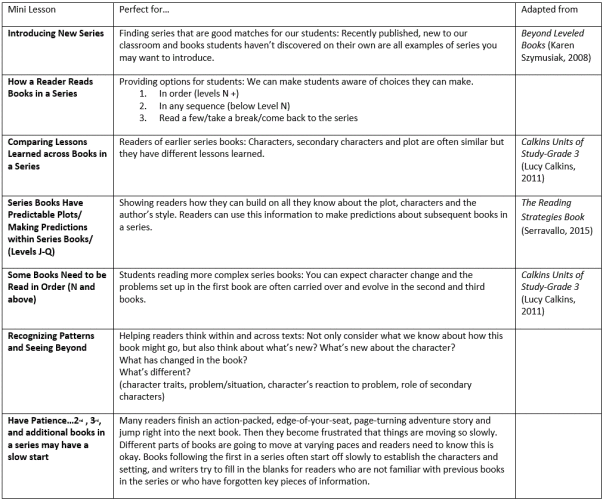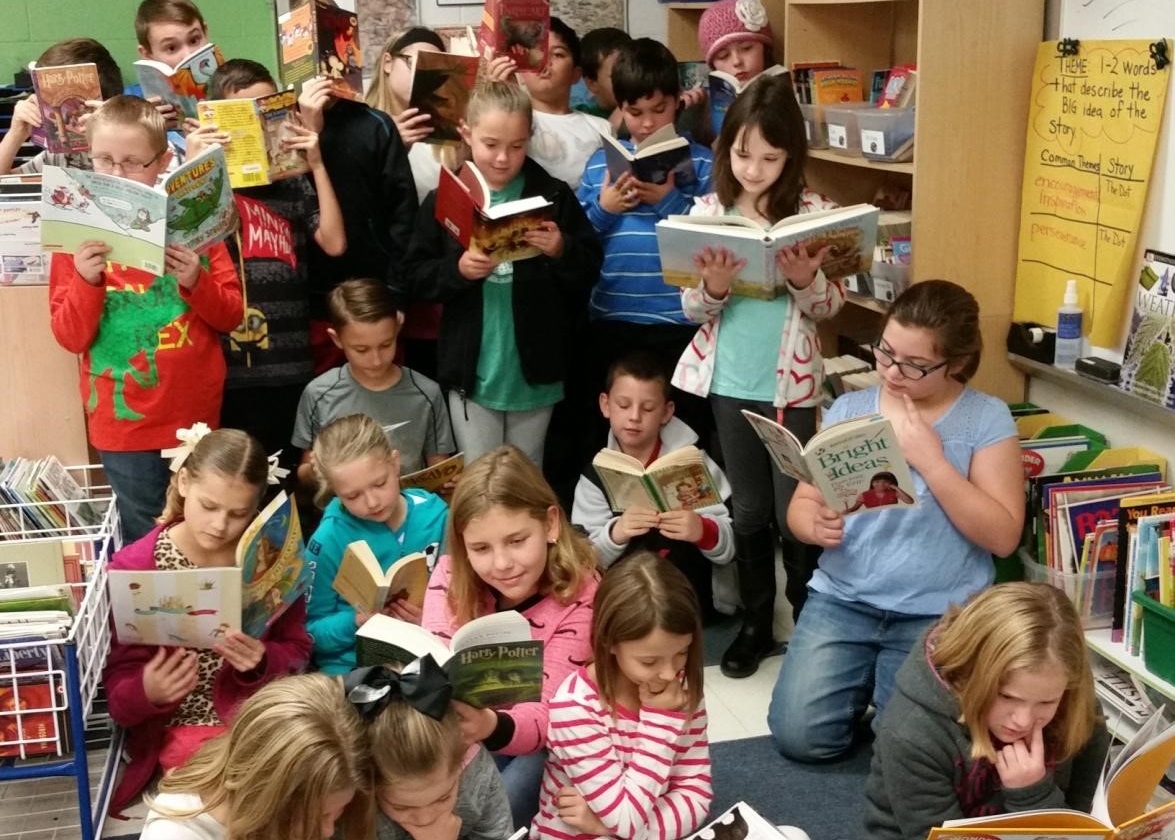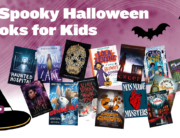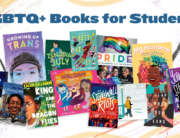You’ve heard about those people. You know the ones. Like that lady who read 21 of the Janet Evanovich’s Stephanie Plum books and just got Tricky Twenty-Two for Christmas. She talks about the Women’s Murder Club like she’s a member and Alex Cross like they’re good friends[i]. She’s the lady who pre-ordered every copy in the Harry Potter series. And on a five day trip to Disney World she’s the one who started and finished The Hunger Games trilogy (being 5 months pregnant with twins left a lot of reading time in the Magic Kingdom).
My name is Jenifer Pastore, I am THAT lady, and I am addicted to series books.
I know this sounds familiar. We’re everywhere! Series addicts. We just can’t get enough of … whatever it is that keeps us reading them. I never really considered why series books were so intriguing to readers of all ages, until I met my new fourth graders this year. What is it about series that we love so much? And more importantly, how can we, teachers and parents, nurture this love and help it grow even stronger, helping to create passionate, lifelong readers?
Choosing Series for the Classroom
After 10 years working in literacy, I was elated to be heading back to fourth grade this past August. I know that growing and supporting readers depends on three key factors: access, choice and time. So I spent the summer planning for an amazing classroom library that would provide access to just-right books for every reader who would walk through my door. I hadn’t spent a great deal of time in middle grades so I had a lot of preparation ahead of me. I relied on research, recommendations from colleagues, suggestions from in-house experts (my fourth grade son and sixth grade daughter), and even Pinterest.

The conclusion: fill my shelves and bins with as many series and favorite authors as I could get my hands on. And my experts were very specific about which authors and series are MUST haves.
Fast forward to December. I now know my readers quite well. I know who has devoured every single Rick Riordan book ever published. I know who my book droppers are. One thing they all have in common is their love of books in a series. For some, it’s just a matter of finding the right one.
 A classroom library full of series
A classroom library full of series
Series for Reluctant Readers
 I have a special relationship with my reluctant readers. These friends need that perfect series to entice them. This year The Genius Files has been my go-to series for my less confident readers. Some of their recent reflections provide evidence of this.
I have a special relationship with my reluctant readers. These friends need that perfect series to entice them. This year The Genius Files has been my go-to series for my less confident readers. Some of their recent reflections provide evidence of this.
“I love The Genius Files! There are bad people that are trying to kill them! In the book there is a girl and a boy fighting for their lives to escape drowning in oil, stuck in tubes of ice cream and drowning in liquefied Spam while trying to get to their Aunt Judy’s wedding.” Allie Grace
These readers have all attempted the fad reads in our room: Land of Stories, Harry Potter and Percy Jackson. But when I got the Genius Files in their hands it was a breath of fresh air for them. One student summed it up perfectly:
“The best series ever is The Genius Files because you jump right into the action. Not like Harry Potter (when) it takes you 50 pages to (to get to the action).” J.T.
Not only was I happy that J.T. found a series he loves, but I was proud of his thoughtful insight about who he is as a reader and the kinds of books that are just right for him.
In our class we read aloud from picture books and chapter books (most that are NOT series books). Occasionally, we will read a short whole-class novel. Our mini lessons come from these texts. But my students choose their independent reading books and that’s where they apply all of the skills and strategies shared in the mini lessons. They have time every day to read, discuss and respond to their texts.
Reading Workshop with Series
Understanding Characters was the Reading Workshop unit that helped me recognize ways our character studies could go beyond the books in our hands right now. I realized as we talked about traits, supported our thinking with evidence, noticed character changes and explored character relationships, that many of these ideas didn’t apply just to the books in our hands. Most could also extend to our thinking about characters across books in the series. I needed to be teaching within our texts and across the texts as well.
Think about Harry Potter and how his character changes and develops as he encounters new struggles and complications throughout the series. His character grows, changes and evolves as he deals with every situation. Readers can also pay attention to how his relationships with characters like Hermoine, Snape and Dumbledore evolve within texts and across texts.
Several mini lessons focus on strategies needed only by certain students. This is also true when it comes to readers of books in a particular series. For example, some readers new to the Percy Jackson books will realize that keeping track of mythological characters helps them in understanding the books better. Many of them stop to research elements of mythology, adding the information to their reader’s notebooks. Series like Harry Potter include many words created by the author that are crucial to the meaning of the texts. You cannot understand Harry Potter books without knowing about Muggles, Quidditch or Death Eaters. Some readers need to be taught explicitly to pay attention to these kinds of words and keep track of them as needed.
I learned that when my students seem to be wandering aimlessly in and out of different series, it’s a good time to hold a Preview Week. The goal of a Preview Week is to introduce new books/series by sharing a book trailer and then reading the first one or two chapters. During our first Preview Week this year I introduced Gregor the Overlander, The Books of Elsewhere, and The Genius Files. The result of the preview: two of those three series now have waiting lists. It truly is an emergency in Room 317 when someone finishes a book in a series and the next one is not available. We hit the library and then every intermediate classroom in our hall. Late night runs to the local bookstore are not unheard of. Desperate times call for desperate measures, and I’ve discovered a little book hoarding happening with particular books in a series.
One of the most rewarding aspects of series books I’ve discovered is that a below level reader can be successful with above level books through a combination of determination (she REALLY wanted to read Land of Stories), collaboration (seeking and receiving support from other readers of this series), intention (during conferences and mini lessons I ask questions and address strategies and skills to support her specific needs as she navigates through the complexities of the text), and especially CELEBRATION (we’re talking hugs, happy dances, emails to mom and dad and LOTS of bragging). I know that the more I know about these books, the more I can teach readers to be successful in reading them.
Serial Observations
Below are a few other important observations I’ve made this year with my diverse group of 9 and 10-year-olds that relates directly to series books in the classroom:
- They want to read what other kids are reading.
- They want other kids to read what they are reading.
- They get very excited talking about their books and often engage in conversations about them. This often happens first thing in the morning as they compare the events of their evening reading.
- Students reading in the same series, regardless of which book they are on, tend to choose reading spots near each other and try to sneak in book talks as they read.
- They have figured out that different books/series have to be read in different ways.
- Every time I introduce a new book, they ask, “Is this a series?”
- They often refer to other students as ‘experts’ of certain series. Callie is our go-to reader for anything Land of Stories, and I send readers of Charlie Bumper over to Payson.
In a recent informal poll, I asked school-age readers to name their favorite book series. I received responses from readers in K-8 (and I think a few titles were slipped in by several moms too). I saw familiar titles showing up repeatedly. Magic Tree House, Diary of a Wimpy Kid, and Land of Stories, are a few of the top picks.  Some favorites spanned many grade levels. Harry Potter and Percy Jackson are two series loved by readers from 4th through 8th grades. And some series clearly have stood the test of time. The Little House series and The Boxcar Children are still among the favorites despite publication dates as early as the 1930’s!
Some favorites spanned many grade levels. Harry Potter and Percy Jackson are two series loved by readers from 4th through 8th grades. And some series clearly have stood the test of time. The Little House series and The Boxcar Children are still among the favorites despite publication dates as early as the 1930’s!
I expected to see most of the titles named as favorites. But I also recognized that two of the titles named were new to me. What does that tell me? There are so many more authors and series just waiting to be loved by readers. You know what that means … time to go book shopping. James Patterson says, “There’s no such thing as a kid who hates reading. There are kids who love reading and kids who are reading the wrong books.” So maybe, just maybe, I still have the wrong book in Sam or Ashlynn’s hands. I know there is THAT book/series/author that is waiting to be loved by them.
Series I will be adding to my stacks:
- Peter and the Starcatchers (Grades 5-9, Level X, Lexile 770) – recommended by a friend
- Pegasus (Grades 3-7, Lexile 620)– I’ve heard it’s the “Percy Jackson for girls.”
- Tuesdays at the Castle (Grades 3-7, Lexile 860)– I have lots of readers interested in princesses, castles, and fairy tales
- Masterminds (Grades 3-7, Lexile 730)-because I got to meet Gordon Korman and hear about this one firsthand and I would love for my students to recognize how great his books are
- Fame and Glory In Freedom, Georgia (Grades 4-6, Level O, Lexile 740)- this one is recommended to hook some reluctant readers on a great author (Barbara O’Connor)
- Joey Pigza* (Grades 4-7, Level T, Lexile 970)- J.T. loved it
- Series of Unfortunate Events* (Grades 4-12, Level V, Lexile 1010)- just because I haven’t read them and Jonathan told me I should
*struggling reader recommendation

My name is Jenifer Pastore and I am addicted to series books. My students are too. And it’s fabulous!
Getting started with series books in your classroom or trying to be more intentional in your instruction? Here are a few mini-lesson ideas adapted from some of the experts.
Series Mini-Lessons
[i] James Patterson – Women’s Murder Club Series, Alex Cross Series
References and Further Reading
Calkins, L. a. (2011). A Curricular Plan for the Reading Workshop- Grade 3. Portsmouth, NH: Heinemann.
Serravallo, J. (2015). The Reading Strategies Book: Your Everything Guide to Developing Skilled Readers. Portsmouth, NH: Heinemann.
Szymusiak, K. S. (2008). Beyond Leveled Books. Portland: Stenhouse.








Thanks for including my books in your review, Jenifer!
Dan Gutman
http://www.dangutman.com